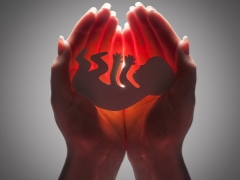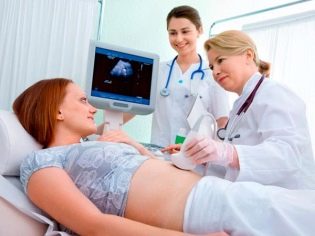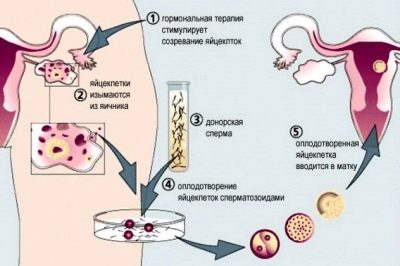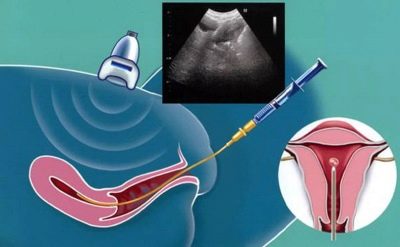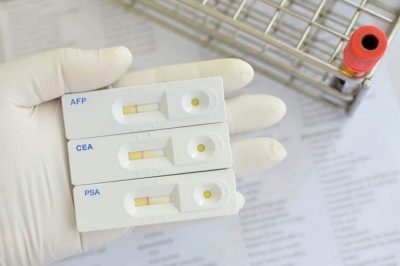The effect of IVF on women's health: all the pros and cons
IVF allows infertile couples to become happy parents. In vitro fertilization is one of the greatest achievements of modern medicine, however, as in any method that involves human intervention in natural processes, IVF has its own dangers and risks. We will talk about the effects of IVF on women's health in this article, weighing the pros and cons.
The essence of the procedure
The essence of in vitro fertilization is that doctors help to create the most important thing - the meeting of the egg and sperm. In some forms of infertility, this process is the biggest problem for the spouses. With obstruction of the fallopian tubes in women, with failures in her menstrual cycle, if ovulation does not occur, independent conception is impossible. If a man has too few motile sperm cells or the total number of sperm cells is critically reduced, IVF also comes to the rescue.
First, the woman undergoes ovarian stimulation. With a normal cycle on the day of ovulation, only one egg leaves the follicle, rarely two. Stimulation with hormonal drugs helps doctors get several ripe eggs to increase the chances of fertilization and successful pregnancy.
Stimulation is carried out in the first half of the menstrual cycle. Doctors track the maturation of follicles by ultrasound. When the eggs mature sufficiently, the woman undergoes ovarian puncture under general anesthesia or local anesthesia.
The resulting eggs are fertilized in the laboratory, and not in the fallopian tube, as is the case with natural conception. Otherwise, the process is not much different - the sperm cells are in the same nutrient medium with the eggs, fertilization occurs as a result - and after a couple of days, doctors can say with certainty how many good quality embryos they have received.
In the uterus, a woman is planted 2, less often 3 embryos. The rest, if any, may be frozen and left in the cryobank until the next attempt, if pregnancy does not occur this time.
To maintain an appropriate hormonal background in the second half of the cycle, a woman may receive other hormones. If in the process of stimulation follicle-stimulating hormones are used, then in the process of waiting for implantation of implanted embryos, a woman is prescribed progesterone preparations, since it is this hormone that helps to keep the pregnancy, to prepare the uterine endometrium for implantation. Progesterone also partially suppresses the future mother’s immunity so that the embryos are not rejected as foreign.
Sometimes IVF is performed in the natural cycle without prior stimulation with hormones. At the same time, doctors receive one, maximum two eggs, and after fertilization they transfer embryos to the uterus. The second half of the cycle also takes place without drug support. Naturally, the effectiveness of this type of IVF is significantly lower than the efficiency in the stimulated cycle.
Often this method is used if success was not achieved in the first stimulated protocol, and frozen eggs or cryopreserved embryos were left in the cryobank, suitable for transfer in a new cycle.
IVF can also be carried out with the use of donor eggs and embryos, donor sperm, but these types of artificial insemination proceeds without a significant additional load on the female body, one of the methods described above, either in a stimulated cycle or in a natural cycle.
In addition, IVF puncture can be long and short. For long, doctors cause artificial menopause - suppressing ovulatory activity for several months. After the abolition of hormones begin preparing the ovaries in superovulation and egg collection. In the short protocol, artificial menopause is not created.
The choice of the type and nature of the protocol is the task of the doctor, which is based on the woman’s state of health, on her history, the causes of infertility, if they are identified, and on laboratory data.
Negative consequences
Theoretically, negative consequences for women's health can occur at any stage of in vitro fertilization. It is not necessary that they come, but every woman who decides on a possible IVF needs to know about their capabilities.
The first is to consider the effect of hormonal stimulation before ovulation. In a long protocol, a woman can feel all that the fair sex feels when she enters into a real menopause - the sensation of ebbs and flows, severe headaches, mood swings, irritability, tearfulness. Often there is nausea and even vomiting.
It should be noted that not all women have menopause symptoms pronounced, sometimes they are smoothed out, and hormonal preparation for IVF is more “even”.
Stimulation of the ovaries, which occurs further, according to the sequence of the procedure, can be quite dangerous. It requires from the attending physician a great deal of experience and an individual approach in the calculation of dosages of hormones, the scheme of their reception. The entire process of maturation of follicles should be carefully monitored. Constant evaluation of the response of the ovaries to hormones is needed. According to doctors, it is this stage that often harms the female body.
The most dangerous consequence is ovarian hyperstimulation syndrome, in which women experience severe lower abdominal pain, bloating, nausea and vomiting. Hyperstimulation can cause premature depletion of the ovaries. Often a woman recovers greatly in a short time. She has nervous breakdowns.
The probability of a negative effect of hormones is the higher, the more stimulated IVF attempts are made by the patient. That is why it is recommended to do no more than 5-6 IVF with stimulation. It is advisable to freeze the eggs and embryos in order not to resort to hormonal stimulation in every protocol.
The next stage, which can be fraught with danger to the woman, is puncture. The collection of mature eggs is carried out in a clinical setting with local or general anesthesia. A puncture is made in the posterior wall of the vagina, after which the follicular contents with the oocytes present in it are sucked out from the ovary with a thin needle. The process itself, if carried out correctly under sterile conditions, usually does not cause complications. But after it there may be pain in the lower abdomen and lower back, slight nausea and malaise for several days after the procedure.
In general, this stage is considered one of the safest. According to medical statistics, complications of puncture occur only in 0.1% of cases of IVF. And they are usually associated with the violation by medical staff of the requirements for processing instruments and the addition of infection during the insertion of a cannula.
The last stage of IVF - embryo transfer. This is the most difficult of all stages.But the likelihood of complications with it is minimal. Only in 0.2% of women small bleedings are recorded after the transfer of fertilized eggs. Physiologically-induced spotting after transfer is considered normal for two weeks after embryo transfer into the uterine cavity.
At the stage of subsequent hormonal therapy in the stimulated cycle, the purpose of which is to support implantation and the development of pregnancy, complications are possible only in the form of the absence of implantation or detachment of the ovum, if he even managed to attach to the functional layer of the uterus. This can happen if the doctor chooses the wrong dosage of progesterone and its derivatives. If this hormone in a woman’s body is not enough, pregnancy cannot develop.
Another consequence of IVF, which not all women like - the likelihood of multiple pregnancy. In 45-60% of cases, when two or more embryos are planted, at least two of them will survive.
Going to IVF, you need to honestly answer the question whether you are ready for the birth of not one, but two or three babies. If the answer is yes, then we can safely go on the procedure. If the answer is no, you should definitely discuss with the doctor the possibility of replanting only one fertilized egg, but prepare for the fact that there can be quite a few protocols, because the predicted effect will also be halved.
Long-term effects
There is an opinion that pregnancy in women after successful IVF is more difficult, with complications and pathologies. There is some truth in this. The disadvantages of reproductive technologies are that they “force” an organism to become pregnant, which was not going to do this at all.
It is natural that the body at every opportunity will try to get rid of pregnancy. Therefore, the majority of women to some extent, there is a threat of miscarriage almost throughout the pregnancy, and in later periods - the threat of premature birth.
That is why women after IVF attend an obstetrician-gynecologist in the antenatal clinic more often than pregnant women who conceive a baby in a natural way.
In childbirth, unpleasant "surprises" are also not excluded, which is why most women who become pregnant with IVF are advised to have a cesarean section.
Another long-term consequence, which cannot but be said, is psychological shocks and depressions that can threaten a woman after several unsuccessful attempts at in vitro fertilization.
Quite often, a woman may need professional help from a psychologist, psychotherapist, taking sedatives, and hypnotherapy. The more unsuccessful attempts behind the back, the higher the level of stress, the more dangerous the consequences for the woman’s psyche can be. Deciding on another attempt is becoming increasingly difficult, and going through another setback is harder and harder. To this, too, should be prepared in advance.
Oncology
The question of the relationship of IVF and the subsequent appearance of cancer in women is particularly acute. After the death of Zhanna Friske, who went through IVF to give birth to a son of Plato, after the death of his wife Konstantin Khabensky, who also used reproductive services, many believe that IVF creates a predisposition to the development of malignant processes in the woman's body.
Many studies have been conducted, some of which have found such a relationship, others have not found such a connection. The opinion of modern oncologists is pretty straightforward: IVF, or rather high doses of hormones in stimulated cycles can affect the growth and progress of existing tumors. Quite often, it is not possible to identify them in the early stages, and many tumors (for example, breast cancer), being hormone-dependent, begin to actively increase after birth.
Recent studies have shown that in healthy women, even after several stimulated cycles, primary cancers do not develop. However, you should pay more attention to your health. Between the protocols, if the first and second failed, experts recommend donating blood for tumor markers in order to notice the beginning processes in time, if they take place.
In this case, the woman will need to take a pause, be treated for oncology and then again refer to the fertility specialist - after cancer with a successful cure, IVF is not contraindicated.
Early aging
This is another burning issue that worries many women. It is believed that women who have experienced IVF, menopause occurs earlier. Studies of this issue is not enough, because IVF started to do only 40 years ago. The first women who went through artificial insemination and became mothers thanks to him, did not track the time of menopause. The second generation of eco-moms, which is more numerous, shows that the onset of age-related menopause is different for everyone.
Indeed, hormone therapy, especially if it is repeated, depletes the ovaries, the ovarian reserve, given by nature to a woman for her entire reproductive life, ends more quickly. According to reviews, a number of women after IVF have menopause up to 40 years. However, there are many who have menopause only closer to 50 years.
In general, the prospect of early menopause is not so scary for women who dream of motherhood. Usually, the prospect that menstruations stop earlier is not very embarrassing, because the woman’s reproductive task will be completed.
Endocrine disorders
It is believed that IVF is very harmful to the health of the thyroid gland and its normal functioning. There is some truth in this. During stimulation, a woman receives such an amount of hormones that her body is forced to “dispose of” in an emergency mode, because in normal life, no such amount of hormonal substances are produced by the human body outside the IVF protocol.
As a result, various endocrine disorders may occur, and the thyroid gland suffers most often. There may also be problems with the adrenal cortex, with other endocrine glands. It is possible to correct such consequences. The main thing is to consult an endocrinologist in time to get a corrective treatment. If the endocrine problem is detected early and treated correctly, then it can be managed without long-term consequences in 95% of cases.
Circulatory and heart problems
Sometimes the effects of hormonal stimulation have negative echoes regarding possible circulatory disorders, vascular diseases, blood clotting disorders, as well as the development of cardiomyopathy - weakness of the heart muscle. It should be noted that such consequences occur less frequently than other disorders, and they are easily corrected by the therapist and cardiologist.
Arguments about irreversible processes in a woman's body after IVF (successful or unsuccessful) are usually not tenable. Like everything new, in vitro fertilization has its supporters and opponents. For some reasons (religious, economic, social), the existence of negative IVF myths is quite beneficial, which they warm up and support in every way.
Lifespan
The most ridiculous of these myths is the life expectancy after IVF. Someone thought that women after the procedure live no more than 11 years. Life expectancy hormone therapy for IVF does not affect. It can reduce the disease, the use of anesthesia, for example, when conducting a caesarean section, but there is no direct and proven relationship again.
The responses of women in this respect are quite unequivocal - there are women who raise their teenagers conceived and born through IVF.There are women who became grandmothers - their eco-kids have long grown up and become parents themselves (by the way, having conceived naturally). Therefore, to say that the life of a woman will be limited to some kind of time frame is wrong and even silly.
findings
If a husband and wife intend to go on IVF, you need to know about the risks, but do it in the best way in a civilized way - having discussed everything with your doctor Unfortunately, some people trust the opinion of unknown sources so much that they may abandon the prospect of becoming parents because of fear of consequences, which are often exaggerated.
About what consequences for the body may be after the IVF procedure, see the next video.
